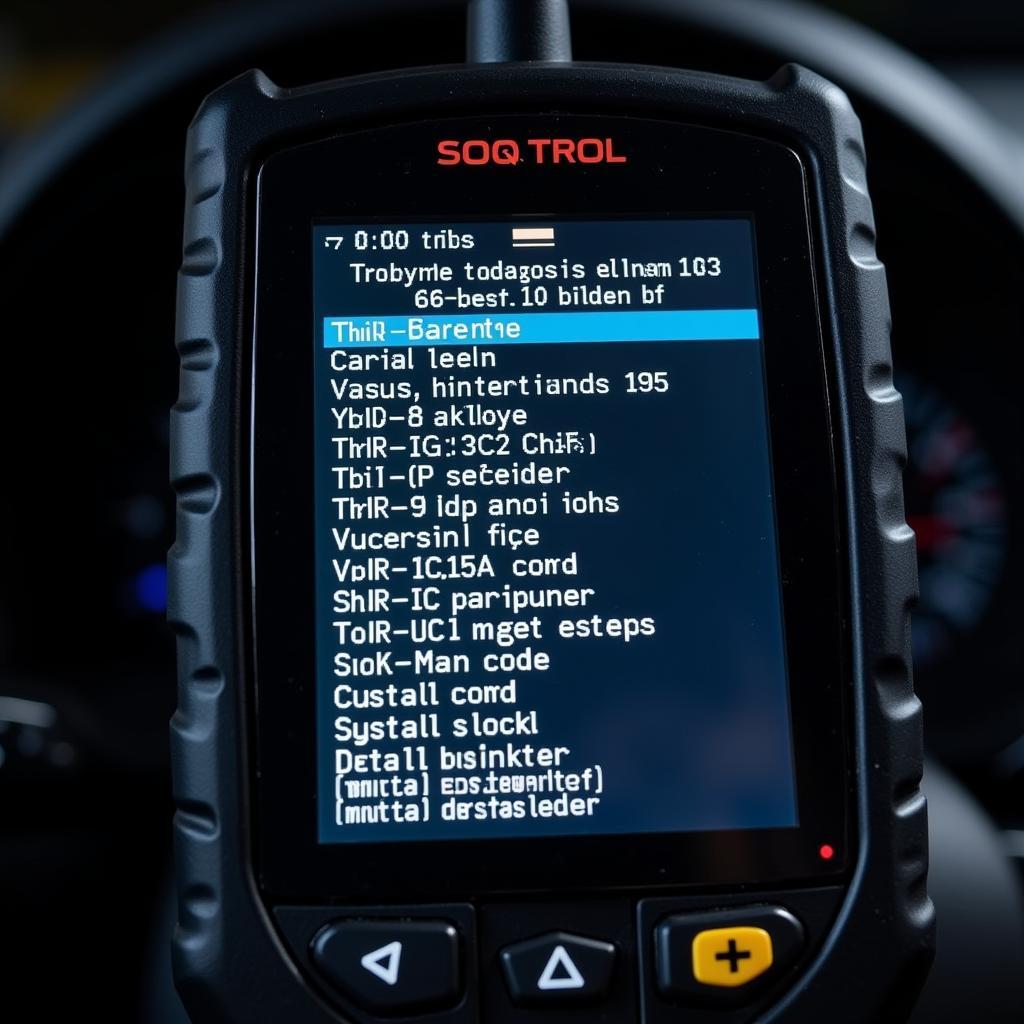A diagnostic car test, also known as an OBD-II scan, is a vital tool used to identify issues within your car’s systems. By connecting to your car’s onboard computer, this test reads and interprets stored diagnostic trouble codes (DTCs), providing valuable insights into potential problems. But What All Does A Diagnostic Car Test Show, and how can this information help you?
Decoding the Data: Understanding Diagnostic Trouble Codes
A diagnostic car test primarily reveals DTCs, which are alphanumeric codes that correspond to specific issues within your vehicle’s systems. These codes are standardized across most car manufacturers, making them universally understandable by mechanics and technicians.
 Diagnostic trouble codes displayed on a scan tool screen
Diagnostic trouble codes displayed on a scan tool screen
Beyond the Codes: Unveiling the Scope of a Diagnostic Test
While DTCs are central to a diagnostic test, the information it reveals goes far beyond just codes. Here’s a glimpse into what a diagnostic car test can show:
- Engine Performance: The test can uncover issues related to fuel mixture, ignition timing, air intake, and emissions control, helping diagnose problems like misfires, reduced power, or poor fuel economy.
- Transmission System: It can detect faults within the transmission control unit, solenoids, and sensors, potentially identifying slipping gears, rough shifting, or complete transmission failure.
- Brake System: Issues with the ABS system, brake fluid levels, and brake pedal position sensors can be revealed, ensuring optimal braking performance and safety.
- Airbag System: The test can check the functionality of airbags, seatbelt pretensioners, and impact sensors, crucial for ensuring occupant safety in case of a collision.
- Emissions Control: It can identify problems with the catalytic converter, oxygen sensors, and evaporative emissions system, ensuring your vehicle complies with environmental regulations.
Interpreting the Results: A Collaborative Approach
While a diagnostic car test provides invaluable information, interpreting the results often requires the expertise of a qualified mechanic. They possess the knowledge and experience to:
- Accurately diagnose the root cause of issues based on DTCs and other data.
- Differentiate between minor glitches and serious problems that require immediate attention.
- Develop a comprehensive repair plan tailored to your vehicle’s specific needs and budget.
Beyond Repair: Preventive Maintenance and Peace of Mind
Remember, a car diagnostic test isn’t just for troubleshooting existing problems. Regular diagnostic tests, even when your car seems fine, can:
- Detect potential issues early on, preventing costly repairs down the line.
- Provide insights into your driving habits and their impact on your vehicle’s health.
- Offer peace of mind knowing that your car is in optimal condition.
FAQs: Your Questions About Car Diagnostic Tests Answered
Q: How often should I get a car diagnostic test?
A: It’s generally recommended to get a diagnostic test at least once a year or whenever your car’s check engine light turns on.
Q: Can I perform a diagnostic car test myself?
A: Yes, affordable OBD-II scanners are readily available, allowing you to read basic DTCs. However, interpreting the results and addressing complex issues often require professional expertise.
Q: Are all car diagnostic tests the same?
A: The depth of information provided can vary depending on the sophistication of the diagnostic tool used. While basic scanners provide DTCs, advanced tools used by mechanics offer a more comprehensive analysis of your car’s systems.
Q: How much does a diagnostic car test cost?
A: How much is a car diagnostic test? The cost can range from free at some auto parts stores to a fee charged by mechanics, usually as part of a larger service.
Q: Can car diagnostics be wrong?
A: Can car diagnostics be wrong? While rare, there’s a slight chance of inaccurate readings due to sensor malfunctions or other factors. That’s why it’s crucial to consult a qualified mechanic to validate the findings.
Driving Informed Decisions: The Value of Diagnostic Testing
A car diagnostic test is an invaluable tool for any car owner. By understanding what does a diagnostic test show on a car, you empower yourself to make informed decisions about your car’s maintenance and repair.
Remember, early detection is key to preventing major car problems and saving money in the long run. What does a car diagnostic test show? It shows you the path to a safer, more reliable, and ultimately, more enjoyable driving experience.
Need Expert Assistance?
Contact DiagFixPro today via WhatsApp: +1(641)206-8880 or Email: [email protected]. Our dedicated team is available 24/7 to answer your questions and provide top-notch car diagnostic support.

Leave a Reply